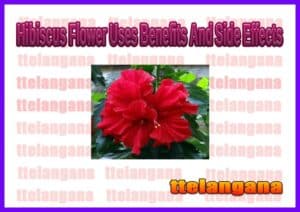Hibiscus flower Of Uses Benefits and Side Effects
Hibiscus flower, also known as Roselle or Hibiscus sabdariffa, is a vibrant and versatile flower that has been used for centuries due to its numerous uses, benefits, and potential side effects. This tropical flower is native to Africa but is now cultivated in various parts of the world, including Asia and the Americas.
Uses of Hibiscus Flower:
Culinary Use: Hibiscus flowers are commonly used in culinary applications. They can be dried and brewed to make herbal tea, known as hibiscus tea or sorrel. The tea has a tart flavor and is often sweetened with honey or sugar. Additionally, the petals can be used as an edible garnish in salads, desserts, and drinks.
Medicinal Use: Hibiscus flower possesses several medicinal properties. It is rich in antioxidants, including flavonoids and anthocyanins, which help protect the body against oxidative stress and reduce inflammation. Traditional medicine systems have used hibiscus flowers to treat various ailments, such as high blood pressure, liver disorders, urinary tract infections, and respiratory issues.
Skincare: Hibiscus Flower is renowned for its skincare benefits. It is often used in cosmetic products due to its natural astringent and moisturizing properties. Hibiscus extracts can help tighten the skin, reduce the appearance of wrinkles, and promote a youthful complexion. It is also used in hair care products to nourish and condition the hair.
Natural Dye: The vibrant petals of the hibiscus flower contain natural pigments that can be used as a natural dye. They produce shades of red, pink, and purple, and are used to color fabrics, textiles, and even food products.
Hibiscus flower Of Uses Benefits and Side Effects

Benefits of Hibiscus Flower:
Blood Pressure Management: Hibiscus flower has been studied for its potential blood pressure-lowering effects. Some research suggests that regularly consuming hibiscus tea may help reduce systolic and diastolic blood pressure, thus contributing to cardiovascular health. However, more studies are needed to establish the exact mechanisms and dosage requirements.
Antioxidant Properties: The high antioxidant content in hibiscus flowers helps combat free radicals and oxidative stress, which are implicated in various diseases, including cancer and cardiovascular conditions. Antioxidants promote overall well-being and may help protect against chronic illnesses.
Liver Health: Hibiscus flower has traditionally been used to support liver health. Studies have shown that hibiscus extracts may have hepatoprotective properties, helping to prevent liver damage and promote liver function. However, more research is needed to fully understand its effects on liver health.
Digestive Health: Hibiscus flower has been used in traditional medicine to promote healthy digestion. It is believed to possess mild laxative properties and can aid in relieving constipation. Additionally, hibiscus tea is often consumed after meals to aid digestion.
Weight Management: Some studies have suggested that hibiscus flowers may have potential benefits for weight management. It has been found to inhibit the production of amylase, an enzyme responsible for breaking down carbohydrates, potentially reducing the absorption of carbohydrates and promoting weight loss. However, further research is needed to validate these findings.
Side Effects and Precautions:
While hibiscus flower is generally considered safe for most people when consumed in moderation, there are a few considerations to keep in mind:
Drug Interactions: Hibiscus flower may interact with certain medications, including antihypertensive drugs, antidiabetic medications, and diuretics. It is advisable to consult a healthcare professional if you are taking any medication to determine potential interactions.
Hypotensive Effect: Hibiscus flower may have a hypotensive effect, meaning it can lower blood pressure. If you already have low blood pressure or are taking medications to lower blood pressure, consuming hibiscus flower products may cause a further drop in blood pressure. Monitoring blood pressure levels is recommended.
Pregnancy and Lactation: Pregnant or breastfeeding women should exercise caution when consuming hibiscus flower products. Limited research is available on its safety during these periods, so it is best to consult a healthcare professional before including it in your diet.
Allergic Reactions: Some individuals may be allergic to hibiscus flowers. If you have a known allergy to plants in the Malvaceae family, such as marshmallows or okra, it is advisable to avoid hibiscus flowers to prevent allergic reactions.
Digestive Discomfort: Consuming large amounts of hibiscus flower products may cause mild digestive discomfort, including stomach cramps, diarrhea, or nausea. It is recommended to start with small quantities and monitor your body’s response.
Iron Absorption: Hibiscus flower contains compounds that may inhibit the absorption of iron from plant-based sources. Individuals with iron-deficiency anemia or those relying on plant-based iron sources should be mindful of this potential interference.
It’s important to note that the information provided here is for informational purposes only, and it is always recommended to consult with a healthcare professional or a qualified herbalist before incorporating hibiscus flower into your diet or skincare routine, especially if you have any pre-existing medical conditions or are taking medications.
Tags: hibiscus tea benefits and side effects, hibiscus flower, hibiscus flower benefits, hibiscus tea side effects, hibiscus tea, hibiscus tea benefits, benefits of hibiscus flower, hibiscus, benefits of hibiscus tea, hibiscus flower tea, hibiscus flower for hair, hibiscus tea recipe, health benefits of hibiscus tea, hibiscus tea health benefits, hibiscus side effects, hibiscus tea benefits weight loss, benefits of hibiscus, hibiscus tea for high blood pressure, side effects-